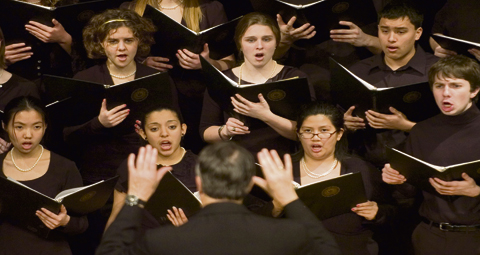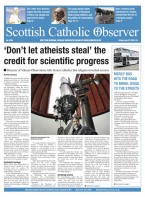
Liturgical changes strike a chord
— Church music is an opportunity to find guided harmony and unity, not a time for personal preferences
Do the recent changes in the liturgy herald the beginning of a new era in church music, or for some, a return to the past?
The changes certainly make those in charge of music for the liturgy take a closer look at its suitability. That is a positive step. There are many who have long complained that the Church has jettisoned a veritable treasure trove of music since the changes brought about by the Second Vatican Council. The recent changes would seem to have provided a braking system to what has seemed to many to have been a downward slide in standards in church music, and that can only be a good thing. Of course there has been a considerable amount of singable and Liturgically relevant music produced here in Scotland, but there has also been an incursion of material which has the hint of advertising jingles about it, banal words hauled along behind rhythms which have a commercial feel to them.
Where no standard was set for church music, this was inevitable. The days of the ‘Imprimatur’ are long gone… and church music in general suffered the consequences. Now, new Mass settings, music written for the Liturgy must be submitted to the Bishops’ Conference for approval. That would seem to be a very positive step.
Of course, there will be heated argument about it all. That’s usually the case with all things musical. It has always seemed something of a paradox to me that something as beautiful as music can be a breeding ground for prejudice, rivalry, jealousies and indeed snobbery. We all refer to musical preferences as ‘Our Music’ as indeed it is, those preferences being rooted in our life experiences and indeed in our very natures, and we will defend our choice of music with every fibre of our being. Church music is a different matter. There, we have to consider suitability for the Liturgy and the beauty and dignity which that entails.
Pope Benedict XVI has given us guiding principles for church music in recent writings. Apart from its Liturgical relevance, it should help to raise the thoughts of the faithful to a spiritual plane. There should be a time for the faithful to listen or to sing or indeed to enjoy the beauty of silence. As a church musician, I was so glad, so reassured to read those words. Why? Because I’ve been a church musician since the years just preceding the Second Vatican Council and remember in my parish the second Mass on a Sunday being a Missa Cantata, when the congregation often joined with the choir in singing Plainsong. The ‘Asperges Me’ at the start of Mass was positively thunderous. I lived in a country parish. Our church was a small church. The parish priest, however, was a gifted musician who had trained as a lyric tenor in Rome and had given up the chance of a professional career as a singer to become a priest. He was also an accomplished pianist and organist, a Liturgist with an eye for the fine detail. In short, he was an inspiration.
When the Second Vatican Council came along, and the changes in church music became apparent, I remember him sighing deeply.
“I fear for the future,” was all he said.
At that point, I didn’t think I had much of a future as a church musician. Almost overnight, the guitar seemed to become standard equipment for church music. Church organists became an endangered species, old fashioned beings, trapped in the mists of nostalgia. It seemed to me that majesty and mystery had been hustled towards the exit, that informality was the way to go. Great emphasis was placed on getting congregations to sing in unison; choirs were told that they were no longer choirs, but ‘leading groups’. Plainsong disappeared to be dumped in the pile marked ‘Nostalgia’ and ‘new’ music flooded in and was often accepted not on merit, but on the personal preference of the parish priest or his delegate.
It was a long exile for some church organists. They simply didn’t match up with what seemed to be an increasing feeling of informality in church. In a way, church music seemed to become ‘The People’s Music,’ to use a term much beloved by politicians.
An illustration of that particular mindset has been increasing frequency of requests or secular music to be included at weddings and funerals. That is usually dismissed as simply ‘a sign of the times’, but is it also a marker for the gradual change in standards which has crept up us over the years?
Now, as Plainsong has come into the light again, there’s a feeling that a real change has begun. There’s a sense that there are mixed feelings about this particular area. Recently, I’ve heard it described variously as ‘old-fashioned’, ‘too difficult’, ‘incomprehensible to the congregation’… and even ‘boring’. To be fair, those who criticise it have little or no experience of it. Its timeless, seamless beauty holds no difficulties for church choirs. Similarly, Latin holds no difficulties for the congregation, given that translations are readily to hand, and that our language is liberally sprinkled with Latin roots. Plainsong runs closely to the modulation of speech, is easy to learn and aside from its suitability for use in the liturgy and its spiritually enhancing sound, it apparently has therapeutic properties and relaxes the mind. I’m thinking now of the fact that numerous recordings of Plainsong have been produced in recent years, their purpose being to de-stress the anxious. There’s no mystery about it, no great difficulty. It has endured as a treasure of the Church for centuries.
There are members of the church choirs who learned it as children and who have total recall of it. I am sure I wouldn’t be alone in welcoming its return.
I’m sure that church musicians will also be glad to know that Pope Benedict has expressed the intention to incorporate areas of music and indeed architecture into seminary studies. For our priests, eventual responsibility across these areas will be helped by such studies. Church musicians in particular need the support of their clergy. Could that support be stronger than it is at present? It’s hard to generalise about this, but I do think that more could be done to support and encourage musicians. There are well-qualified musicians who hesitate to offer their services because they feel that their abilities will not be valued. This is not vanity. It is the knowledge that they cannot ‘do their job’ properly if the parish priest is less than receptive. It happens here and there, now and then. Indifference is another bugbear. Organists, music groups, choir members… all of them have their commitment reinforced by an occasional visit from the parish priest, by interest expressed.
And support should be given to parishes which are poorly resourced musically. They are to be commended for their efforts in the face of practical difficulties. As with all church musicians, their music, their commitment, is an offering to their Maker, a part of their prayer lives and surely as pleasing to God as those who have more musical advantages at their disposal. And so, as we move on past this particular signpost in church music, one thing will not change. Our best barometer of how things are going will be the comments of the congregation. There lies honesty and also frequent encouragement. And we church musicians need that. Speaking of encouragement…
I had a liberal Christmas helping of that when two new choir members presented themselves, full of enthusiasm. They are aged nine and twelve. Church music is alive and well…












“It is the knowledge that they cannot ‘do their job’ properly if the parish priest is less than receptive.”
Yes!
There is also the problem of (non-voluntary) ignorance of the existence of liturgical music strictly speaking, that just as there is a gospel and collect of the day, so there are “notes” of the day. The mis-match in the post-conciliar liturgy between the texts given in the Missal and those in the Gradual makes it easy to miss this fact! And I’m sure it is entirely possible to attend numerous workshops on liturgical music, even run under diocesan auspices, and be none the wiser. And then there’s the Dunning-Kruger effect …